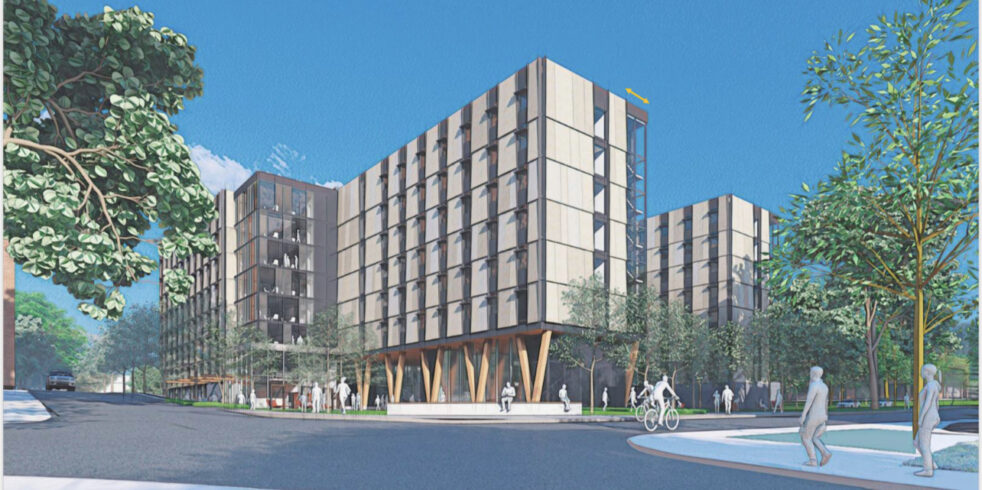In line with its increasing global prominence, Tech welcomed 4,890 new students in Summer and Fall 2023, raising the total undergraduate enrollment to over 19,000 — a previously unachieved feat.
Furthermore, the number of students, faculty and staff on campus is projected to grow by 26% over the next decade, according to the most recent Comprehensive Campus Plan (CCP).
More Jackets could mean fewer study spots in the library, longer lines at Blue Donkey and fewer on-campus housing spaces; however, Tech has taken steps to amend the latter.
In Feb. 2023, the Georgia Board of Regents approved the construction of a new housing dorm on West Campus.
They expect to start construction in the summer of this year and complete it by Fall 2026.
The Board of Regents intends to build the new 191,000-square-foot residence between Eighth St. and Ninth St. at an estimated
cost of $117 million.
It will house 862 beds, collaborative learning spaces, community lounges and group kitchens.
The dorm will also include indoor and outdoor bike parking, a fitness recreational space and a gaming room.
Speaking on the updates, Kasey Helton, Associate Vice President for Campus Services, said that good progress has been made so far.
“We are done with 80% of the design and right on schedule,” she said. “This will be Tech’s first new construction since 2005, when 10th and Home opened to accommodate our growing graduate and family student populations. We are excited about being able to further accommodate our first-year students and paving the way for important improvements on our aging residential inventory, while maintaining affordability and offering a compelling and supportive residential experience.”
The construction also occurs in tandem with Tech’s 10 Year Strategic Plan as the Institute plans to raise its enrollment in the coming years.
“We know that research shows, particularly for undergraduate students, that being able to live on-campus is correlated with the number of positive outcomes people experience — such as feelings of belonging, academic success and high retention rates,” said Luoluo Hong, Vice President for Student Engagement and Well-Being. “[The new housing will] help Georgia Tech make positive advances in increasing access, enhancing the quality of the co-curricular experience and cultivating well-being.”
Bharat Goyal, first-year MS CS, lived on West Campus throughout his four years of undergraduate studies, and he spoke to the advantages of on-campus housing from a student perspective.
“I only chose to [live on campus] because it’s located pretty close to campus, and the rents are not bad compared to off-campus housing,” he said. “I didn’t want to be concerned with finding summer sublease, which is a major headache when you go off-campus. Also, when you live in college housing, you’re kind of within the university system which gives you a sense of security, and when you stay on campus, you can also walk around freely at night because the campus is much safer.”
Speaking about her experience, Hope Dobbelaere, second-year MATH, said that she enjoyed living in the dorms and that she got close with her roommate.
She spent her first two years at Towers and North Avenue apartments, respectively, and deemed it “a rite passage of sorts into your other years [at Tech].”
However, she also added that her apartment had water leaks, bug infestations and outdated electrical connections, so she decided to live in Midtown for the next year.
She hopes the new dorm is constructed with modern amenities and is better maintained.
The construction is also inspired by Tech’s 2023 CCP, which is a “living framework” for the development of our campusover the next decade.
“The creation of the [CCP] will guide campus development and capital investments on and around the Atlanta campus for the future,” said Maria Cimilluca, Vice President of Infrastructure and Sustainability at the Institute. “This is significant because it will also strengthen Georgia Tech as an anchor institution for the neighboring communities and Atlanta as a whole.”
The last plan in 2004 inspired buildings and improvements such as the EcoCommons, the John Lewis Student Center and the development of Tech Square. After the construction on West Campus, the focus will shift to East Campus housing, where Smith and Howell will be the first to go offline for renovations.
The CCP also suggests optimizing dining hall operations and bringing more third-party food vendors, building additional research and learning facilities and student recreation centers.
The new dorm brings hope that the Tech Housing’s waitlists may move faster and more incoming students will enjoy the “freshman experience,” and upperclassmen will be able to explore more options for housing — both on-and-off-campus.
